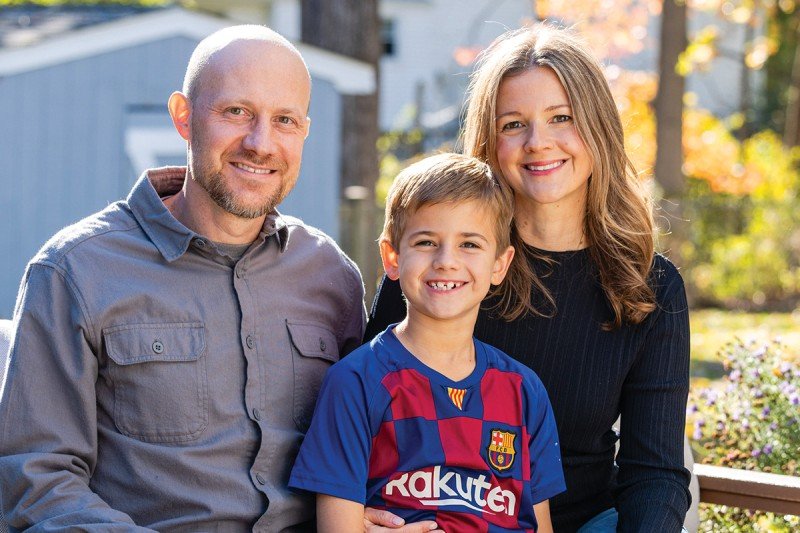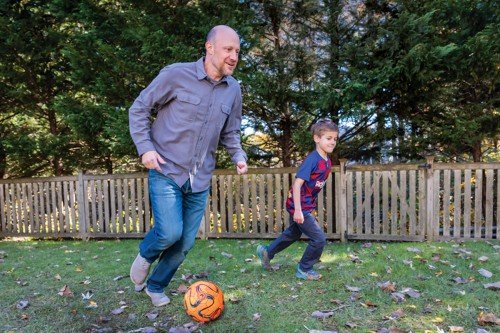
In the spring of 2021, Mark Denisiuk began feeling unwell. He had a sore throat and was always congested. His doctor diagnosed a sinus infection. Then Mark started having night sweats and extreme fatigue.
“In the past, I had always powered through any illness I had, but the night sweats worried me,” says Mark, a 46-year-old civil engineer who lives in Madison, New Jersey. When he suddenly grew too tired to get out of bed, his wife, Lauren, insisted he go back to the doctor. His doctor ordered blood work and the next day immediately referred him to a hematologist. A bone marrow biopsy at a local hospital revealed that Mark had acute myeloid leukemia (AML), an aggressive blood cancer that usually affects older people.
Lauren, who works in the pharmaceutical industry, began calling every doctor she knew for advice. Just four days after his diagnosis, Mark was admitted to Memorial Sloan Kettering Cancer Center, under the care of hematologic oncologist Aaron Goldberg.
Mark ultimately ended up enrolled in a phase 1 clinical trial of a drug created based on translational research conducted at MSK. His case is a dramatic example of the critical and growing importance of translational research — where basic scientific discoveries about the behavior of cells are translated into experiments aimed at developing new therapies for patients.

Major Research Grant Recognizes MSK’s Expertise
In September 2021, MSK’s leukemia team received a prestigious SPORE (Specialized Programs of Research Excellence) grant from the National Institutes of Health (NIH) to expand its translational research program. The grant is overseen by physician-scientist Omar Abdel-Wahab, Director of MSK’s Center for Hematologic Malignancies (CHM) and Edward P. Evans Endowed Chair for Myelodysplastic Syndromes (MDS).
Efforts funded by the grant will focus largely on AML, the most common type of leukemia in adults, which affects about 20,000 people in the United States every year.
“Despite advances in recent years, AML is still a really tough disease,” Dr. Abdel-Wahab says. “We are directing our efforts there because it’s where we feel we have the opportunity to make a big difference.”
The SPORE grant will allow investigators to accelerate a number of initiatives, including developing new cell-based treatments for AML. They are also looking for ways to overcome resistance to targeted therapies.
A Trial for a New Class of Drugs
Before Mark could begin treatment for his cancer, he needed surgery to alleviate swelling in his sinuses caused by the leukemia. The procedure was performed by MSK surgeon Marc Cohen. Then Dr. Goldberg started Mark on cocktail of chemotherapy drugs.
The treatment was intense. Mark spent 42 days in the hospital and lost 35 pounds. Unfortunately, another bone marrow biopsy revealed he still had a high number of leukemia cells in his body. Dr. Goldberg tried another difficult chemotherapy regimen, and Mark spent another 22 days in the hospital. But the results were only slightly better.
Then came a new ray of hope. Dr. Goldberg recognized that Mark’s leukemia had a chromosome abnormality called an MLL rearrangement, which might respond well to a specific targeted therapy. He referred Mark to Eytan Stein, who leads MSK’s Program for Drug Development in Leukemia, for treatment on a clinical trial of an experimental drug called SNDX-5613.

It’s in a new class of drugs called menin inhibitors. In MLL-rearranged leukemias and leukemias with a mutation in a gene called NPM1, there is a protein called menin that causes the disease to develop and grow. Research at MSK led by physician-scientist Scott Armstrong, now at Dana-Farber Cancer Institute in Boston, showed that menin could be blocked with drugs, thwarting the growth of leukemia cells.
Knowing Mark loves to garden, Dr. Stein explained it using this analogy: “Imagine your blood and bone marrow are like a garden. If you have leukemia, there are a lot of weeds mixed in with the flowers. With chemotherapy, you use an herbicide that kills everything, and hope that only the flowers will grow back. But this drug can cause leukemic cells to become normal cells, and then you make the weeds bloom into flowers.”
The medication is a simple pill Mark took at home. Unlike the harsh side effects from previous treatments, Mark says, “I felt like I kept getting stronger and stronger as time went on. I really had no side effects.” Three months later, his leukemia was in remission.
In December 2021, Dr. Stein presented the first results from the trial that Mark participated in at the American Society of Hematology annual meeting. He reported that 55% of patients responded to the menin-blocking drug. Some of them were still doing well after six months.
The following donors have made significant gifts that have been instrumental in advancing blood cancer research at MSK:
- Peter and Susan Solomon
- Edward P. Evans Foundation
- Comedy vs Cancer, founded by Niccole and Jeremy Kroll, Jennifer Rogers, and Robert Carlock
- Steven A. Greenberg Charitable Trust
- Mr. and Mrs. Donald G. Calder
- George L. Ohrstrom, Jr. Foundation
- Paul E. Singer Foundation
- Melvin Berlin Family
- Nassef Sawiris
- Nonna’s Garden Foundation
Collaboration Drives Translational Advances
The kind of translational research that has led to the success of drugs like menin inhibitors is possible thanks to wide-ranging collaborations across MSK. The Center for Hematologic Malignancies includes lab researchers from both the Human Oncology & Pathogenesis Program and the Sloan Kettering Institute (SKI), in addition to clinical investigators. Scientists including SKI cancer biologists Scott Lowe, a Howard Hughes Medical Institute Investigator, and Michael Kharas can work directly with doctors to focus on developing new treatments.
Researchers rely heavily on the Hematologic Oncology Tumor Bank, directed by physician-scientist James Young. “Most people with hematologic cancers who come to MSK for treatment are happy to donate their blood and/or tissues for research,” Dr. Young says.
The bank holds thousands of samples from patients treated for a range of hematologic cancers, as well as samples from bone marrow transplant patients and their donors.

Grateful for a Second Chance
After Mark recovered from chemotherapy and lengthy hospital stays, he was able to walk his 7-year-old son, Benjamin, to school and play soccer in the backyard. Then came more encouraging news: Because the menin inhibitor had put his leukemia into remission, Mark learned that he qualified for a bone marrow transplant, which could cure his disease.
While his genetic makeup made it challenging to find a match, doctors found Mark a donor through a public cord blood bank. (These banks contain umbilical cord blood that parents donate after their babies’ births.)
Cord blood has the advantage that a perfect match between the donor and the patient is not required. Mark received his transplant in November 2021 and was discharged from inpatient care in mid-December.
“I’m really grateful to Dr. Stein, Dr. Goldberg, and MSK’s exceptional nursing staff, as well as the rest of the team involved in this clinical trial. It gave me a second chance at life when there were not many options left,” Mark says. “I also could not have gone through the treatments so successfully without my wife, Lauren, who has been there for me and our son every step of the way.”







